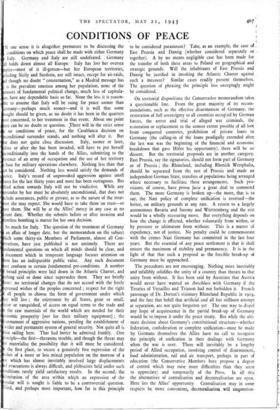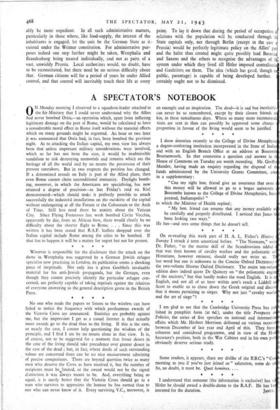CONDITIONS OF PEACE
N one sense it is altogether premature to be discussing the conditions on which peace shall be made with either Germany Italy. Germany and Italy are still undefeated. Germany 11 holds down almost all Europe. Italy has lost her oversea pire—most of it ill-gotten—but her European territories, cluding Sicily and Sardinia, are still intact, except for air-raids, d though no doubt " consternation," as a Madrid message has is the .prevalent emotion among her population, none of the mours of fundamental political change, much less of capitula- n, have any dependable basis so far. None the less it is reason- le to assume that Italy will be suing for peace sooner than rmany—perhaps much sooner—and it is well that some ought should be given, as no doubt it has been in the quarters ost concerned, to her treatment in that event. About one point ere can be no doubt or question. :There will in the strict sense no conditions of peace, for the Casablanca decision on onditional surrender stands, and nothing will alter it. But at does not quite close discussion. Italy, sooner or later, fore or after she has been invaded, will have to put herself onditionally into the hands of the Allies, submitting to the esence of an army of occupation and the use of her territory base for military operations elsewhere. Nothing less than that n be considered. Nothing less would satisfy the demands of slice. Italy's record of unprovoked aggression against small tates for the last thirty years and more has been outrageous. But Hied action towards Italy will not be vindictive. While any rrender by her must be absolutely unconditional, that does not lude assurances, public or private, as to the nature of the treat- nt she may expect. She would have to take them on trust—or ave them. She will be at the Allies' mercy in any case at no stant date. Whether she submits before or after invasion and tentless bombing is matter for her own decision.
So much for Italy. The question of the treatment of Germany' an affair of longer date, but the memorandum on the subject hich some thirty-six Members of Parliament, almost all Con- rvatives, have just published is not untimely. There are ndamental questions on which all minds should be clear, and document which in temperate language focuses attention on em has an indisputable public value. Any such document ust conform to certain fundamental pre-conditions. A number broad principles were laid down in the Atlantic Charter, and othing said or done since supersedes them. They are briefly ese: no territorial changes that do not accord with the freely pressed wishes of the peoples concerned ; respect for the right all people to choose the form of government under which y will live ; the enjoyment by all States, great or small, ctor or vanquished, of access on equal terms to the trade and the raw materials of the world which are needed for their onomic prosperity [not for their military equipment] ; the sarmament of aggressive nations, pending the establishment of wider and permanent system of general security. Not quite all is ain sailing here. That had better be admitted frankly. One nnciple--the first—threatens trouble, and though the threat may of materialise the, possibility that it will must be considered.
the first place, to secure a genuinely free expression of the fishes of a more or less mixed population on the morrow of a ar which has almost inevitably involved large displacements d evacuations is always difficult, and plebiscites held under such nditions rarely yield satisfactory results. In the second,. the limitation of the area within which an expression of the pular will is sought is liable to be a controversial question. hird, and perhaps most important, how far is this principle to be considered paramount? Take, as an example, the case of East Prussia and Danzig (whether considered separately or together). A by no means negligible case has been made for the transfer of both these areas to Poland on geographical and strategic grounds. Will the inhabitants of East Prussia and Danzig be justified in invoking the Atlantic Charter against such a measure? Similar cases readily present themselves. The question of phrasing the principle less sweepingly might be considered.
On territorial dispositions the Conservative memorandum takes a questionable line. From the great majority of its recom- mendations, such as the effective disarmament of Germany, the restoration of full sovereignty to all countries occupied by German forces, the arrest and trial of alleged war criminals, the restoration or replacement to the utmost extent possible of all loot from conquered countries, prohibition of private loans to Germany (the calling-in of the loans prodigally extended after the last war was the beginning of the financial and economic breakdown that gave Hitler his opportunity), there will be tic dissent. But the territorial proposals are in another category. East Prussia, say the signatories, should not form part of Germany or of Prussia ; tho-. Rhineland, including Rhenish Westphalia, should be separated from the rest of Prussia and made an independent German State, transfers of populations being arranged where necessary to facilitate these arrangements. Such pro- visions, of course, have prima facie a great deal to commend them. The more Germany is broken up—the more, that is to say, the Nazi policy of complete unification is reversed—the better, on military grounds at any rate. A return to a largely autonomous Bavaria and Saxony and Wurttemberg and the rest would be a wholly reassuring move. But everything depends on how the change is effected, whether voluntarily from within, or by pressure or ultimatum from without. This is a matter of expediency, not of justice. No penalty could be commensurate with the crimes Nazi Germany has committed in the last four years. But the essential of any peace settlement is that it shall ensure the maximum of stability and permanency. It is in the light of that that such a proposal as the forcible break-up of Germany must be approached.
The precedents are not encouraging. Nothing more inevitably and infallibly solidifies the unity of a country than threats to that unity from without. It has been said by Austrians that Austria would never have wanted an Anschluss with Germany if the Treaties of Versailles and Trianon had not forbidden it. French patronage of Dr. Dorten's visionary Rhineland Republic in 1919, and the fate that befell that artificial and all but stillborn attempt at separation, are not quite forgotten yet The one way to dispel any hope of acquiescence in the partial break-up of Germany would be to impose it under the peace treaty. But while the ulti- mate decision about Germany's constitutional structure—whether federation, confederation or complete unification—must be made by Germans themselves the Allies have no call to recognise the principle of unification in their dealings with Germany when the war is over. There will inevitably be a lengthy period of Allied occupation, involving control of disarmament, food administration, rail and air transport, perhaps in part of education (the Conservative Members here propose a degree of control which may raise more difficulties than they seem to appreciate) and temporarily of the Press. In all this the alternatives of centralisation and decentralisation are open. Here lies the Allies' opportunity. Centralisation may in some respects be more convenient, decentralisation will unquestion- ably be more expedient. In all such administrative matters, particularly in those where, like food-supply, the interest of the inhabitants is engaged, let the unit be the German State as it existed under the Weimar constitution. For administrative pur- poses indeed one step further might be taken, Westphalia and Brandenburg being treated individually, and not as paits of a vast, unwieldy Prussia. Local authorities would, no doubt, have to be reconstituted, but there need be no serious difficulty about that. German citizens will for a period of years be under Allied control, and that control will inevitably touch their life at every point. To lay it down that during the period of occupation relations with the population will be conducted through State capitals only, not through Berlin (except in the case Prussia) would be perfectly legitimate policy on the Allies' par and the habit thus created might quite possibly lead Bavari and Saxons and the others to recognise the advantages of system under which they lived till Hitler imposed centralisati and Gauleiters, on them. The idea (which has good, though n public, parentage) is capable of being developed further. certainly ought not to be dismissed.



























 Previous page
Previous page